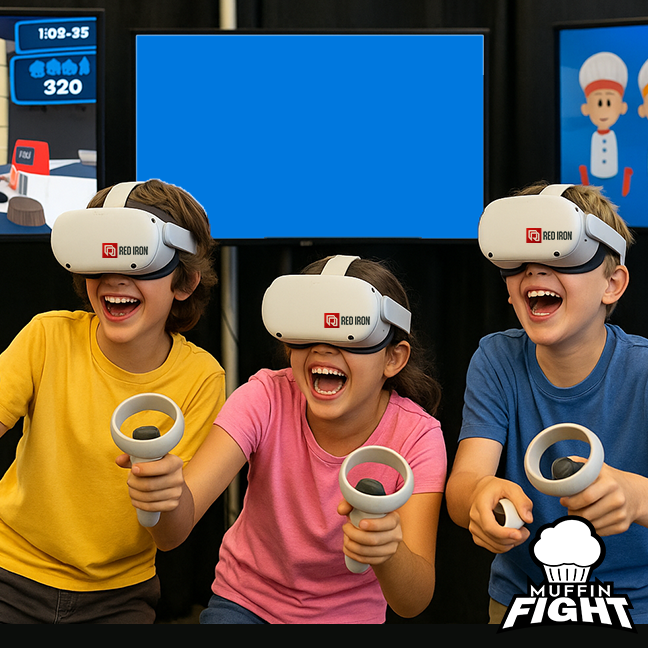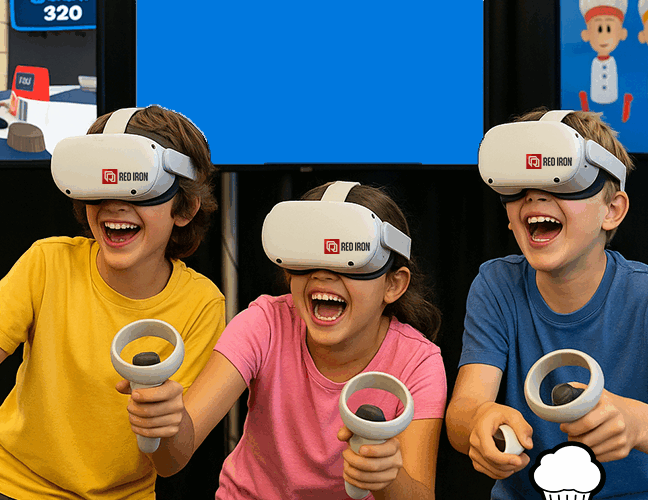
Play is not downtime. Play builds real skills. Every laugh, rule negotiated, and “try again” moment shapes who kids become.
Yet play is often dismissed as optional — a break from “real” learning. But research shows that play builds real skills. Play is where emotional intelligence takes root. And for today’s kids, play may be the most important teacher they have.
Our Why: From Lab to Aha Moment
We founded Red Iron Labs as a place for experiments. The “labs” in our name was intentional. It meant testing, prototyping, and learning by doing.
For years, those experiments focused on adults. We built training tools, post-secondary simulations, and healthcare learning platforms. The work mattered, but something kept pulling us toward education in a broader sense.
Muffin Fight began as one of those experiments. A silly VR game where kids gathered, baked, and threw muffins. Nothing more. Or so we thought.
When we showcased it at events throughout 2022 and 2023, something happened. Parents watched as shy kids lit up. Kids who lost still laughed, rejoined, and played again. Strangers became teammates in the middle of playful chaos.
In those moments, Muffin Fight stopped being just a game. It became a lab for connection. That was our aha moment. Emotional intelligence wasn’t only taught in classrooms. It was practiced, in real time, through play.
From that moment, our hypothesis turned into conviction: learning through play could transform how kids build life skills.
Why Now: The Urgency
Kids today aren’t just visiting the internet. They are born into it. For them, digital spaces feel as normal as playgrounds once did for us.
The problem is, these new playgrounds have no guardrails. They can feel chaotic, unkind, or unsafe. Sometimes, it looks more like Lord of the Flies than healthy play.
At the same time, schools and workplaces are waking up to the importance of social-emotional learning (SEL). The SEL market is set to grow from $3.6 billion in 2023 to $10.3 billion by 2028 (MarketsandMarkets, 2023). Why? Because grades alone don’t predict success. Soft skills do — and they account for up to 85% of career achievement (WiseWorld AI, 2024).
Meanwhile, kids spend hours every day on screens. Most of that time is passive: scrolling, watching, consuming. But reports show 40% of U.S. schools are expected to add VR learning by 2025 (Scoop, 2024). Teachers and parents are hungry for tools that engage kids in active, meaningful ways.
The takeaway is simple: SEL is urgent, and the demand for better tools is growing fast.
The Problem With the Current System
Grades matter. But research shows grades alone don’t predict lifelong success. Emotional intelligence does.
And yet, in many classrooms, SEL is treated like “extra work.” Kids roll their eyes at empathy worksheets or scripted role-play lessons. What should feel natural often turns into box-checking.
At home, the gap is even bigger. Kids spend hours on screens, but most of it is passive. They scroll, watch, or play games that entertain without teaching.
The truth is clear: kids are already learning through screens — but not the skills they need most.
Vision: A Digital Playground Where Play Builds Real Skills
We believe games can change this.
Games can be more than entertainment. They can be digital playgrounds — spaces where kids practice empathy, resilience, and teamwork.
We’ve seen this in Muffin Fight. What started as playful chaos revealed something deeper: laughter after frustration, collaboration between strangers, and shy kids stepping up with confidence. These moments were small, but powerful.
That’s why Muffin Fight 2.0 is more than a game. It’s a proof of concept. Every mechanic is designed with care:
- Teamwork teaches cooperation.
- Give-to-get mechanics build empathy and reciprocity.
- Frustration tolerance grows patience and resilience.
When kids play Muffin Fight, they aren’t just passing time. They are practicing the skills research shows they’ll need for life.
And this is only the beginning.
Muffin Fight’s Manifesto: Play Builds Real Skills
Play is not “extra.” It is not a reward after the real work is done. Instead, play is the work.
Play builds:
- Resilience through failure and recovery.
- Empathy through shared laughter and cooperation.
- Creativity through imagination and problem-solving.
- Confidence by turning small risks into wins.
This is our manifesto: Play builds real skills. And when designed with intention, games can unlock the emotional intelligence our kids need most.
Further Reading
- Chaos to Connection: The Story Behind Muffin Fight 2.0 Article
- Emotional Intelligence in Gaming: The Essential Skill Article
- Cipriano, C., Strambler, M. J., Naples, L. H., Ha, C., Kirk, M., Wood, M., … Durlak, J. (2023). The state of evidence for social and emotional learning: A contemporary meta-analysis of universal school-based SEL interventions. Child Development, 94(4), 1081–1102. https://doi.org/10.1111/cdev.13968
Full text PDF available here
- Domitrovich, C. E., Durlak, J. A., Staley, K. C., & Weissberg, R. P. (2017). Social-emotional competence: An essential factor for promoting positive adjustment and reducing risk in school children. Child Development, 88(2), 408–416. https://doi.org/10.1111/cdev.12739
Open PDF via CASEL
- MarketsandMarkets. (2023). Social-emotional learning market – Global forecast to 2028. https://www.marketsandmarkets.com/Market-Reports/social-emotional-learning-market-245017024.html?utm_source=chatgpt.com
- Scoop. (2024). AR and VR in education market. https://scoop.market.us/ar-and-vr-in-education-market-news/?utm_source=chatgpt.com
- WiseWorld AI. (2024). Soft skills for career success. Retrieved from https://www.wiseworld.ai/blog/soft-skills-for-career-success
- Yale Center for Emotional Intelligence. (n.d.). RULER: Evidence-based approach to social and emotional learning. Yale Child Study Center. Retrieved from https://medicine.yale.edu/childstudy/services/community-and-schools-programs/center-for-emotional-intelligence/ruler/

